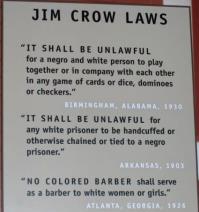
For continuity, Part I of this article may be reviewed here.
Post-Civil War: Jim Crow
Following the abolition of slavery, there still existed government mandated segregation by race and oppression due to race across the board. Apartheid, euphemistically known as “Jim Crow” in the United States, began in the 1870's post slavery at the end of the period of Reconstruction. “Jim Crow” laws were government mandated racial segregation in all public facilities in the states of the former Confederate States of America and in some border states and other states. Jim Crow laws were outlawed, theoretically in 1964 with the Civil Rights Act, although some still were in effect.
The use of the words of “Jim Crow” arose from the name of a minstrel routine, “Jump Jim Crow”. Beginning in 1828, this minstrel routine, “Jump Jim Crow” was performed by its author, Thomas Dartmouth Rice and by many actors and imitators. The words “Jim Crow” was a derogatory epithet for Blacks considered inferior and referred to their segregated life and was a caste system.
Jim Crow was more than almost a century of the enforcement of harsh anti-black laws, it was more than Government laws ordering segregation by race restricting every aspect of a Black person’s life. Jim Crow was a way of life. It was a culture embodying beliefs and ideologies of the superiority of one race over the other in every aspect of their being.
Jim Crow was a cultural caste system that existed between the 1870's and the mid-1960s where blacks and anything relating to being black was considered inferior. It encompassed racist beliefs as to intelligence, ethics, biology, skills, morals, and as to beauty itself. Jim Crow relegated Blacks to the status of second class citizens. Theologians and ministers taught that God supported racial segregation so that whites would not become tainted by contacts with Blacks, unless it was in subservient relationships. Jim Crow restricted where a Black person could walk, purchase food and affected medical treatments. There were harsh and violent consequences sometimes resulting in death when a Black stepped out of his caste. College professors, teachers at every level, and social scientists promulgated the belief that blacks were culturally inferior to whites in every aspect.
It was this underlying sociological caste system that is harder to eradicate despite the passage of anti-discrimination laws making the caste system illegal. It may permeate all aspects of what is considered to be acceptable norms and appearances, such as Blacks should embody a white concept of beauty and have a white hairstyle, rather than a hairstyle that embraces their own biological traits and culture. It was for this reason, that New Jersey passed the Crown Act (an acronym for “Create a Respectful and Open Workplace for Natural Hair Act”) last year, which banned discrimination based on hair textures and hairstyles commonly associated with a particular race or national origin. “Discrimination against black hair is discrimination against black people......Implicit and explicit biases against natural hair are deeply ingrained in workplace norms and society at large.
Business and institutional practices including for employment of high-end professionals can perpetuate cultural patterns. As an example, Black scientists recently called out racism in the research field. A University of Washington Black ecologist was researching how Covid-19 shutdowns have affected wildlife in cities in the US. When he was conducting research fieldwork, he grew concerned about how others perceive him in their neighborhoods when he installs wildlife cameras. This is an example of a century of Jim Crow, although now illegal, still having a cultural influence in present times.
What You Can Do
I am an aggressive and compassionate employment law attorney who is experienced in successfully representing persons who were subjected to racial harassment and retaliation in the workplace and/or were fired. If you have experienced racism at work, or if you reported it and no action was taken, if you are thinking of resigning, or think you will be fired, or have been fired, it is important that you consult with an attorney who is experienced in discrimination.
If you are being subjected to workplace discrimination, contact Hope A. Lang, Attorney at Law today for a free consultation.
Hope A. Lang, Attorney at Law serves clients throughout New Jersey, including Bergen, Middlesex, Essex, Hudson, Monmouth, Ocean, Union, Camden, Passaic, and Morris Counties with locations in southern, central, western and northern NJ to meet with clients.